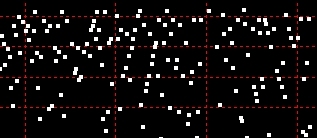| |
Perfect Prime Polynomials
Euler's Formula
Leonhard Euler's quadratic formula belongs to a select group of polynomials that should be called "Perfect Prime Polynomials". In fact, it is the best specimen of this group. The third coefficient, 41, the constant, is equal to the number of prime numbers generated without interruption (from terms 0 to 40). The only other polynomials I know of that belong to this group are n^2 - n + 3, n^2 - n + 5 , n^2 - n + 11, and n^2 - n + 17. Both n^2 - n + 17 and n^2 - n + 41 are also proximate prime polynomials.
| Proximate Primes |
Polynomial |
Number of Primes |
Percent of
Primes |
First 10 Primes |
Perfect Squares |
Finite Difference |
Roots |
| 41, 43, 47, 53 |
n^2 - n + 41 |
582 |
58.20% |
41, 43, 47, 53, 61, 71, 83, 97, 113,
131 |
1681 |
2 |
0.5+/-6.3835726674i |
Proximate Prime
Polynomials that produce more primes than Euler's formula*
* Comparison based on first 1,000 terms.
A promixate prime polynomial is a finite polynomial that is derived from four successive (proximate or neighboring) primes. The following are all quadratic (2nd degree polynomials) - that is, the first coefficient is n^2.
| 53089, 53093, 53101, 53113 |
2n^2 - 2n + 53089 |
634 |
63.40% |
53089, 53093, 53101, 53113, 53129, 53149, 53173, 53201,
53233, 53269 |
54289, 66049, 201601, 361201, 635209, 1194649 |
4 |
0.5+/-162.9240620657i |
| 55661, 55663, 55667, 55673 |
n^2 - n + 55661 * |
622 |
62.20% |
55661, 55663, 55667, 55673, 55681, 55691, 55703, 55717,
55733, 55751 |
none |
2 |
0.5+/-235.9253059763i |
| 55663, 55667, 55673, 55681 |
n^2 + n + 55661 * |
621 |
62.10% |
55663, 55667, 55673, 55681, 55691, 55703, 55717, 55733,
55751, 55771 |
none |
2 |
-0.5+/-235.9253059763i |
| 55667, 55673, 55681, 55691 |
n^2 + 3n + 55663 * |
620 |
62.00% |
55667, 55673, 55681, 55691, 55703, 55717, 55733, 55751,
55771, 55793 |
none |
2 |
-1.5+/-235.9253059763i |
| 27941, 27943, 27947, 27953 |
n^2 - n + 27941 † |
599 |
59.90% |
27941, 27943, 27947, 27953, 27961, 27971, 27983, 27997,
28013, 28031 |
160801 |
2 |
0.5+/-167.1548683108i |
| 27943, 27947, 27953, 27961 |
n^2 + n + 27941 † |
599 |
59.90% |
27943, 27947, 27953, 27961, 27971, 27983, 27997, 28013,
28031, 28051 |
160801 |
2 |
-0.5+/-167.1548683108i |
| 83399, 83401, 83407, 83417 |
2n^2 - 4n + 83401 |
599 |
59.90% |
83399, 83401, 83407, 83417, 83431, 83449, 83471, 83497,
83527, 83561 |
85849, 546121, 1038361 |
4 |
1+/-204.2045543077i |
| 42701, 42703, 42709, 42719 |
2n^2 - 4n + 42703 |
593 |
59.30% |
42701, 42703, 42709, 42719, 42733, 42751, 42773, 42799,
42829, 42863 |
none |
4 |
1+/-146.1181029168i |
| 23669, 23671, 23677, 23687 |
2n^2 - 4n + 23671 |
586 |
58.60% |
23669, 23671, 23677, 23687, 23701, 23719, 23741, 23767,
23797, 23831 |
none |
4 |
1+/-108.7864881316i |
* These 3 polynomials are equivalent.
† These 2 polynomials are equivalent. |

